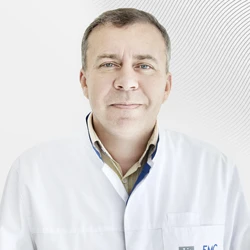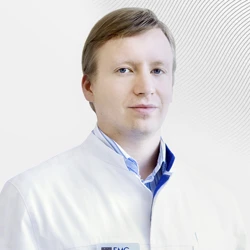Depression - signs and treatment
Depression is a brain disease that is associated with impaired functioning of neurotransmitter systems. Neurotransmitters are substances that transmit information from one nerve cell to another. When this process fails, it is possible to develop a mental disorder.
In depression, the nervous impulse transmission system associated with the neurotransmitters serotonin and norepinephrine is disrupted. This disease is widespread – a quarter of the entire world's population experiences it during their lifetime.
The specialists of the Psychiatry and Psychotherapy Clinic of the European Medical Center (EMC) treat depression of any severity using advanced and proven methods and drugs.
Benefits of treating depression in EMC




To make a diagnosis, a patient must have from one to three main symptoms of depression and several additional ones (depending on the severity of the disease). Main features:
- Persistent decrease in mood for more than two weeks in a row
- A feeling of lack of energy. A person sleeps fully, but after waking up he has little strength (both moral and physical), it is difficult for him to get out of bed and start the day
- Reduced or complete lack of the ability to have fun. His favorite activities no longer please him, the food seems tasteless, he is not interested in anything.
Patients in depressive states cannot entertain themselves in any way and do not even understand what can bring them pleasure. This symptom is called anhedonia.
Additional signs of depression are a decrease in self-esteem, and a person often feels guilty. Patients with depression have impaired cognitive abilities: they feel that they have become more stupid and can no longer cope with their tasks (for example, at work), so sometimes they even quit, feeling incapacitated. Depression is manifested by sleep disorders, decreased libido, and impaired appetite. At the height of a person's condition, suicidal thoughts may appear, which often lead to plans to take their own lives.
Classification
There are several types of depressive states. Unipolar and bipolar are most often distinguished. The Russian classification divides depressions into anxious, dreary and apathetic – according to the predominant affect (that is, according to which clinical symptoms a patient with a depressive state has the most). A separate group of depressive states is masked – those that occur "under the guise" of a somatic disease. For example, a person has hypertension, and its symptoms begin to appear more pronounced than usual, and previous medications stop helping. During the examination, it turns out that depression aggravated the somatic disease. Women may experience postpartum depression due to a sudden hormonal restructuring of the body and a new role in life (especially if this is the first child). The probability of postpartum depression is higher if a woman had depressive disorders before pregnancy.
Stages of depression
Depending on how the physical and mental symptoms manifest, mild, moderate and severe forms of depressive states are distinguished. The mild stage of depression often proceeds unnoticeably, slightly hinders the ability to work; moderate and severe strongly affect the quality of life. Severe depression requires hospital treatment.
The severity of depressive disorder is determined according to the International Classification of Diseases (ICD-10), which is accepted in medical practice around the world.
According to ICD-10, depression is divided into several categories depending on the severity:
- A mild degree is characterized by the presence of several symptoms of depression over a period of several weeks or months. In this case, patients often experience fatigue, insomnia, loss of interest in life and activities, poor mood, and decreased self-esteem. At this stage, patients may also begin to avoid socializing with people and lose interest in everyday activities. At the same time, working capacity is often maintained, and patients do not require hospitalization
- Moderate severity is characterized by the duration of symptoms of depression for several months or a year. At this stage, the symptoms become more pronounced and cover a wider range of mental and physical manifestations. In this case, the symptoms are more pronounced: a person may experience severe anxiety, impaired appetite and sleep, and thoughts of death and the futility of his life.It can also be accompanied by feelings of deep sadness, powerlessness, and despair. A person's self-esteem at this stage of depression becomes extremely low. He may also suffer from drowsiness, loss of appetite, weakness, and body aches
- Severe recurrent depression without psychotic symptoms is characterized by a serious condition that can last a long time. It is accompanied by intense pain that can span a person's entire life. Symptoms may also include suicidal thoughts and actions, which makes treatment more difficult and requires a more intensive approach, usually in a hospital.
- Severe recurrent depression with psychotic symptoms is characterized by the presence of additional psychotic symptoms such as hallucinations, delusions, severe irritability and aggressiveness.
Proper diagnosis and determination of the severity of recurrent depression are very important for choosing the most effective treatment methods. This helps to achieve a better result in the fight against depression.
The stages of depression should not be confused with the stages of the grief reaction.:
- denial
- anger
- bargaining
- depression
- acceptance
Causes of the disease
As a rule, a person has a predisposition to depressive states. So, if someone in the family had this disease, there is a possibility that in adolescence or adulthood a person will also encounter it.
In addition, everyone reacts differently to sad events: where for one, the death of a loved one leads to depressive states, the other experiences the loss much easier. All this indicates a predisposition to depressive states.: external factors only encourage the pathological process in the brain to start.
There are also a number of somatic diseases that can cause depression or affect its course. These are endocrine, autoimmune, cardiovascular diseases, as well as injuries that have led a person to disability. Depression often occurs in the presence of cancer: the fear of imminent death and severe treatment play a special role here; side effects from chemotherapeutic drugs or radiotherapy may also be the cause of the development of depressive states.
Diagnosis of depressive disorders
Most mental disorders are exceptional diagnoses: that is, before making almost any psychiatric diagnosis, the doctor must rule out that this is not a symptom of a somatic disease. For example, that it is not hypothyroidism (decreased thyroid function); or that chronic fatigue is not a symptom of iron deficiency anemia, and so on. Summing up all the research data: a detailed clinical conversation, laboratory tests, clinical and psychological testing, instrumental diagnostic data (MRI, encephalogram), the psychiatrist, during a subsequent clinical interview, diagnoses a depressive state and prescribes treatment in accordance with clinical recommendations and identified criteria.
How to treat depression
Medical and non-medicinal methods are used in the treatment of depressive states. The second group includes psychotherapy as a way of treating depression. The method is selected by a psychiatrist individually for each patient with a depressive disorder.
Prevention of depression
A healthy lifestyle is the best way to prevent depression. These include a balanced diet, reducing alcohol, quitting smoking and using psychoactive substances, proper regular sleep, physical activity, sufficient rest, and having healthy relationships rather than abusive ones. But if depression has already occurred, then all this will not be able to help the patient to normalize his condition.
Medical treatment
Drug treatment of depression is carried out in our clinic in accordance with international protocols and approved clinical recommendations of the Russian Ministry of Health. Selected drugs increase the amount of serotonin and norepinephrine in the synaptic cleft, thereby normalizing processes in the brain and facilitating interneuronal transmission. As a result, the tone of the serotonin and norepinephrine systems increases, and the symptoms of depression disappear.Drug treatment is used for moderate and severe depression. Treatment of mild depression can begin with psychotherapeutic methods, but if it is not effective enough, then it makes sense to add psychopharmacotherapy.
Non-drug treatment
It consists of regular sessions with a therapist. The EMC uses various methods of cognitive behavioral psychotherapy (CBT): it is a scientifically proven method of treating depression. It is used for any stage of the disease, in the case of moderate and severe forms it is combined with drug treatment.
Transcranial magnetic stimulation (TMS), available to EMC patients, can also be used in the treatment of depression. This is a method of overcoming drug resistance. The procedure is based on the action of a focused magnetic field, it is non-contact, issues a series of electromagnetic pulses to certain areas of the cerebral cortex, which have the necessary effect on synaptic transmission.
Treatment of depression in a comfortable EMC hospital
Inpatient treatment is necessary for patients with moderate to severe depression or those who are resistant to medication. These are the main indications for hospitalization. Such patients need to be monitored by both psychiatrists and specialists of other profiles (endocrinologists, cardiologists, therapists), since in conditions of hospitalization, dosages of drugs often increase for greater effectiveness in the treatment of depressive states.
The Clinic of Psychiatry and Psychotherapy of the European Medical Center has its own hospital. It provides round-the-clock monitoring, has trained nursing staff and psychiatrists on duty who are ready to help patients 24/7.
Why the EMC
The first and only clinic in Russia, created in the image of the world's leading clinics
EMC is a multidisciplinary center offering patients a high level of medical services and a personalized approach
Worldwide recognition and awards
 Learn more
Learn more
Worldwide recognition and awards
 Certificates and licenses
Certificates and licenses
Make an appointment for a consultation
Specify your contacts and we will contact you to clarify the details
and new products of the EMC

.webp)

